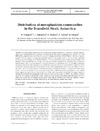Please use this identifier to cite or link to this item:
https://accedacris.ulpgc.es/jspui/handle/10553/48556
| Title: | Distribution of meroplankton communities in the Bransfield Strait, Antarctica | Authors: | Vázquez, E. Ameneiro, J. Putzeys, S. Gordo, C. Sangrá Inciarte, Pablo |
UNESCO Clasification: | 251005 Zoología marina 2510 Oceanografía |
Keywords: | Meroplankton Bransfield Strait Antarctica Invertebrate larvae Distribution, et al |
Issue Date: | 2007 | Publisher: | 0171-8630 | Journal: | Marine Ecology - Progress Series | Abstract: | The spatial distribution of meroplankton in Bransfield Strait, Antarctica, and its relationships with hydrographical conditions are described. Biological sampling was carried out with BIONESS sampling gear at 19 stations and at 5 depths between 10 and 300 m. The main hydrographic features were a shallow hydrographic front in the southern part of the strait that separates Transitional Zonal Water with Bellingshausen influence (TBW) from Transitional Zonal Water with Weddell influence (TWW) and a slope front, the so-called Bransfield front, along the South Shetland Islands Slope (SSI). A northeastward baroclinic jet known as the Bransfield Current (BC) originates from this slope front. The meroplankton community was very diverse and included 12 types of larvae, dominated by polychaete and echinoderm larvae. The meroplankton were more abundant closer to the SSI in the BC and decreased in number towards the Antarctic Peninsula. Polychaete larvae were found close to both shores but mainly close to the SSI in TBW; they were very sparse in the central basin, appeared again below 100 m depth in TWW, and increased in abundance in upper layers at stations between the hydrographic front and the Antarctic Peninsula, in TWW. By contrast, echinoderm larvae mainly occupied the central basin and were always associated with the upper 100 m in TBW, just above the polychaete larvae; they were almost absent from TWW. In summary, meroplanktonic larval exhibit a strong dependence on water masses, depth, and fronts. | URI: | https://accedacris.ulpgc.es/handle/10553/48556 | ISSN: | 0171-8630 | DOI: | 10.3354/meps338119 | Source: | Marine Ecology Progress Series [ISSN 0171-8630], v. 338, p. 119-129 |
| Appears in Collections: | Artículos |
SCOPUSTM
Citations
19
checked on Jun 8, 2025
WEB OF SCIENCETM
Citations
19
checked on Feb 1, 2026
Page view(s)
96
checked on Sep 7, 2024
Download(s)
91
checked on Sep 7, 2024
Google ScholarTM
Check
Altmetric
Share
Export metadata
Items in accedaCRIS are protected by copyright, with all rights reserved, unless otherwise indicated.
